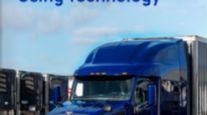Fuso Hybrid Powertrain Might Provide Big-Rig Fuel Economy
This story appears in the Dec. 12 print edition of Transport Topics. Click here to subscribe today.
TOKYO — Mitsubishi Fuso Truck and Bus Corp. is developing a diesel-electric hybrid powertrain for parent Daimler AG’s truck group that could provide the fuel economy gains that have so far been elusive for heavy-duty, over-the-road trucks, the company said.
The hybrid system Fuso is testing in its Super Great Eco Hybrid heavy-duty model is achieving 10% better fuel economy in highway driving than a comparable diesel-powered truck, officials said.
“We definitely see the Super Great Eco Hybrid in our future product line,” Albert Kirchmann, president and CEO of Mitsubishi Fuso Truck and Bus Corp., said during the truck’s introduction to the news media at the Tokyo Motor Show here Nov. 30.
The Super Great Eco Hybrid is a heavy-duty case study for the Daimler truck group. The hybrid technologies being developed in the truck eventually will be used in heavy-duty trucks and buses throughout Daimler, including Freightliner and Mercedes Benz brands, officials said.
Fuso, a Daimler subsidiary, operates the Global Hybrid Center in Kawasaki, Japan, for the Daimler truck group.
The launch date for the hybrid system was still being determined.
“We cannot give a time frame right now. But this powertrain is under development for series production. It is not just a concept,” Gustav Tuschen, head of product engineering at Fuso, said in an e-mail.
While Tuschen declined to say if the 10% fuel economy improvement in the tests was the minimum for bringing the system to market, he did say the company is aiming for a three- to five-year payback for trucks with the hybrid system.
“It is clear . . . that heavy-duty hybrids must provide a significant fuel economy benefit to be appealing to customers and to gain wider market [acceptability],” he said.
The initial markets for deployment also are to be determined, Tuschen said.
“[It] depends on commercial potential in the different markets, customer benefits and/or factors like product development schedules and emissions rules,” he said.
Hybrid powertrains have had varying success reducing fuel use in medium- and heavy-duty trucks in local use. Their best applications seem to be in stop-and-go delivery trucks and in those in which the engine can be turned off and the battery packs used for work duties, such as powering aerial devices. The advantages of a hybrid system in a constant-power over-the-road truck, however, have been more difficult to achieve cost-effectively.
Company officials noted that a small reduction in fuel use in a long-distance heavy-duty truck has a much greater effect on clean air emissions than in a smaller truck in stop-and-go operation. A 2% reduction in fuel use in the Super Great Eco Hybrid and the accompanying reduction in carbon dioxide emissions, for example, equates to a 20% reduction in a light-duty truck, Fuso officials said.
Fuso’s Super Great Eco Hybrid uses a 6-cylinder diesel engine, a 12-speed automated mechanical transmission, electric motor and a new lithium-ion battery pack in a parallel system. In a parallel drive system, the diesel engine supplies the principal power while an electric motor is used to augment the diesel engine as needed.
Fuso has been testing the system on a highway route between Tokyo and Nagoya, about 225 miles each way.




